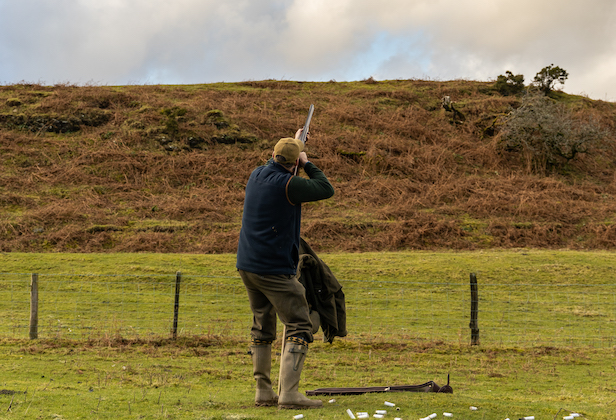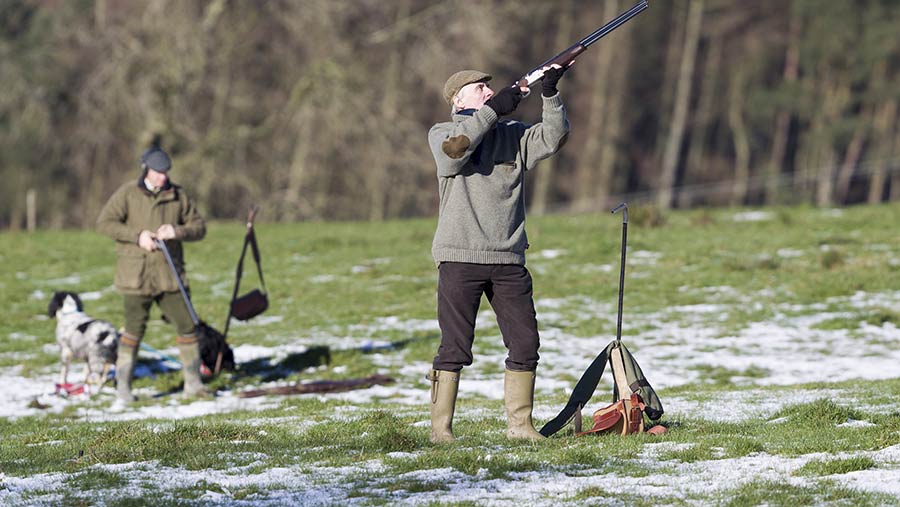No, a farmer in the UK cannot legally shoot you without a justifiable reason, such as self-defense or protecting their property from a legitimate threat.
The use of firearms in the UK is heavily regulated, and any firearm use must comply with the law, which prioritizes public safety.
If you believe you are in a situation where you are at risk of harm, it is important to contact the appropriate authorities or law enforcement for assistance.
When it comes to the topic of farmers and firearms, there are often misconceptions that need to be addressed.
Many people might assume that farmers in the UK have unrestricted access to firearms and can use them at will. This blog post will prevent these misconceptions and shed light on the realities of firearms use in a farming context.
Self-Defense Laws in the UK

The Legal Framework for Self-Defense
In the United Kingdom, self-defense is a fundamental aspect of the legal system, allowing individuals, including farmers, to protect themselves, their property, and others from harm.
The legal framework for self-defense is primarily governed by common law and is reinforced by the Criminal Law Act 1967 and the Criminal Justice and Immigration Act 2008.
The Principles of “Reasonable Force”
Under UK law, self-defense is subject to the principle of “reasonable force.” This means that individuals, including farmers, can use force to defend themselves or others and protect their property as long as the force used is proportionate and necessary.
In other words, the force used must be reasonable, given the circumstances. The law does not require individuals to flee from a threat; they are allowed to stand their ground if they genuinely believe it’s necessary to protect themselves or others.
The Importance of Proportional Force
Proportionality is a critical aspect of self-defense in the UK. Farmers, just like any other citizens, are expected to use force that is proportionate to the threat they face.
A farmer could face legal trouble if they use too much force to protect themselves. The level of force used should be in line with the threat they perceive, and they should stop using force when the threat is no longer there.
Overstepping the bounds of proportional force can lead to charges of assault or even manslaughter.
In essence, farmers and all UK citizens have the right to self-defense, but they must exercise that right with an understanding of the principles of reasonable and proportional force. It is crucial to be aware of these legal guidelines to avoid potential legal issues while protecting oneself, property, or others.
The Use of Firearms by Farmers
Situations Where Farmers Might Consider Using Firearms for Self-Defense
Farmers may find themselves in situations where they consider using firearms for self-defense, typically in rural or remote settings. These situations can include:
Protecting livestock: Farmers may need to use firearms to deter or stop predatory animals that pose a threat to their livestock, such as wolves, foxes, or wild dogs.
Warding off intruders: In some cases, farmers may encounter trespassers, poachers, or individuals attempting to steal equipment or produce. Firearms might be considered to deter such intrusions.
Handling wildlife: Farmers may encounter dangerous wildlife species, such as wild boars or large predators, which could endanger their safety or their families.
The Importance of Non-Lethal Alternatives and De-Escalation Techniques
While firearms can be a tool for self-defense, it’s important to emphasize the use of non-lethal alternatives and de-escalation techniques as the primary means of resolving conflicts. These may include:
Security measures: Using strong security measures like fences, alarms, and cameras can scare away trespassers and keep your property safe.
Non-lethal deterrents: Farmers should consider using non-lethal methods, such as pepper spray or warning devices, to deter intruders or predatory animals.
De-escalation: Farmers should be trained in conflict resolution and de-escalation techniques to handle confrontations peacefully when possible.
Legal alternatives: Familiarizing themselves with legal alternatives to firearms, such as calling the police or engaging in civil remedies, is essential for farmers facing threats or intrusions.
Legal Requirements and Restrictions When Using Firearms for Self-Defense on a Farm
Using firearms for self-defense on a farm comes with specific legal requirements and restrictions, including:
Firearms licensing: Farmers must hold a valid firearm certificate or shotgun certificate to possess and use firearms legally. These certificates specify the type of firearm and its use.
Safe storage: Firearms must be securely stored when not in use to prevent unauthorized access, and farms should have secure storage facilities that comply with the law.
Firearm usage: Farmers should only use firearms when it is a proportionate response to a threat. Overuse or misuse of firearms can result in legal consequences.
Reporting incidents: Any use of firearms for self-defense should be reported to the police as soon as possible. Full compliance with reporting requirements is essential.
Training and responsibility: Farmers using firearms for self-defense should be trained to handle firearms safely and responsibly. They must also be aware of firearm use’s legal and ethical responsibilities.
Real-World Scenarios
Case Studies of Self-Defense Situations Involving Farmers
Case 1: Protecting Livestock from Predators
In a rural area, a farmer used a legally owned shotgun to deter a pack of wild dogs that were attacking his sheep. The farmer fired warning shots, successfully driving the dogs away and saving his livestock.
Case 2: Confrontation with Trespassers
A farmer confronted a group of trespassers who were stealing farm equipment and produce. The farmer called the police and, as a precaution, kept a legally owned shotgun visible to deter further theft until law enforcement arrived.
Case 3: Dealing with a Dangerous Wildlife Encounter
A farmer encountered a wild boar on his property, and the animal displayed aggressive behavior. In this situation, the farmer used a legally owned rifle to shoot the animal in self-defense, ensuring his safety.
Legal Outcomes and Practical Insights
Case 1: Protecting Livestock from Predators
Legal Outcome: The farmer using the shotgun to protect his animals from a potentially deadly threat was considered a reasonable and fitting response. He faced no legal consequences.
Practical Insight: This case highlights the importance of using firearms for self-defense as a last resort when livestock are at immediate risk, and the use of warning shots can be a practical way to deter threats.
Case 2: Confrontation with Trespassers
Legal Outcome: In this case, the farmer acted responsibly by calling the police first and using his shotgun in a visible but non-threatening manner to protect his property. His actions were deemed reasonable, and no legal consequences followed.
Practical Insight: Farmers should prioritize de-escalation and non-lethal alternatives, such as contacting law enforcement when dealing with trespassers. Firearms should only be displayed as a deterrent when necessary.
Case 3: Dealing with a Dangerous Wildlife Encounter
Legal Outcome: The farmer’s use of a firearm to protect himself from a potentially lethal threat was considered a lawful response. The farmer faced no legal consequences for using a firearm in self-defense.
Practical Insight: When encountering dangerous wildlife, farmers should prioritize their safety and have the means to protect themselves, which may include legally owned firearms.
Nonetheless, it’s essential to ensure that there is adequate training and comprehension of when to employ lethal force.
Advice for Farmers

Practical Advice on Protecting Property and Livestock Legally
Implement Security Measures: Invest in practical security measures such as fences, gates, and surveillance cameras. These can deter trespassers and potential threats to your property.
Non-Lethal Deterrents: Consider using non-lethal deterrents like alarms, motion-activated lights, or even guard dogs to discourage intruders and predators.
Proper Lighting: Adequate lighting can help deter trespassers and make your property less appealing for illegal activities during the night.
Community Watch: Consider establishing or joining a local community watch program to enhance the collective security of rural areas.
Communication: Maintain a good relationship with your neighbors and communicate about any suspicious activities or security concerns in the area.
The Importance of Legal Counsel and Local Regulations
Consult Legal Professionals: It is advisable to consult with legal professionals who specialize in property rights and self-defense laws. They can provide guidance specific to your region and circumstances.
Know Local Regulations: Be well-informed about local regulations and zoning laws that may affect your farm. Familiarize yourself with firearm licensing requirements and any additional laws related to rural properties.
Regularly Review Laws: Stay informed about any shifts in self-defense laws and regulations, as they can change over time. Remember that legal standards might differ between different areas.
Join Farming Associations: Joining local farming associations can provide you with a network of support and information, including legal advice, that is relevant to your farming activities.
Report Incidents: If you encounter any threats or unlawful activities, promptly report them to the police and follow the legal procedures for your region. Cooperation with law enforcement is crucial.
FAQs
Can a farmer legally shoot someone in the UK?
No, it is generally illegal for a farmer or any individual to shoot another person in the UK.
Are there any circumstances where a farmer can use firearms against people in the UK?
Yes, in rare cases, farmers may be permitted to use firearms in self-defense or to protect livestock against certain threats, but this must be in line with strict legal requirements.
What laws regulate the use of firearms by farmers in the UK?
The Firearms Act 1968 and other relevant legislation regulate the use of firearms by farmers.
Can a farmer use firearms to protect their property from intruders in the UK?
Using firearms to protect property is generally not permitted, and alternatives like calling the police are encouraged.
Do farmers in the UK need a license to possess firearms?
Yes, farmers and individuals must obtain a valid firearms license to possess and use firearms legally.
Can farmers use firearms for pest control on their land in the UK?
Yes, farmers can use firearms for pest control on their land, but they must do so under legal requirements and regulations.
Are there restrictions on the types of firearms that farmers can use in the UK?
Yes, there are restrictions on the types of firearms and ammunition that can be used, and they must be appropriate for the intended purpose.
Is it legal for farmers to shoot animals on their property in the UK?
Farmers can legally shoot certain animals for specific purposes, such as culling pests or managing livestock, but this is subject to strict rules and regulations.
Are there penalties for using firearms inappropriately in the UK?
Yes, using firearms inappropriately or unlawfully can result in severe penalties, including imprisonment.
Can farmers use non-lethal methods for dealing with intruders or threats in the UK?
Yes, non-lethal methods and security measures should be used as a first resort to deal with intruders or threats on the property.
Is it important for farmers to be aware of and comply with gun control laws in the UK?
Yes, farmers need to understand and adhere to the strict gun control laws in the UK to avoid legal issues and ensure the safety of all parties involved.
Conclusion
In conclusion, farmers are an important part of our communities and agriculture. Ensuring their safety and safeguarding their property are top priorities.
In the United Kingdom, farmers have rights to self-defense, including the use of firearms, but these rights are subject to specific legal guidelines. The following key points have been highlighted:
- Common law, statutes, and legal precedents govern self-defense laws in the UK.
- The principle of “reasonable force” dictates that individuals, including farmers, can use force to protect themselves, others, or their property as long as it is proportionate and necessary.
- Using proportional force is crucial, and overuse of force can lead to legal consequences.
- Firearms should be a last resort for self-defense, with non-lethal alternatives and de-escalation techniques prioritized whenever possible.
- Farmers must comply with firearms licensing, safe storage, and reporting requirements.




